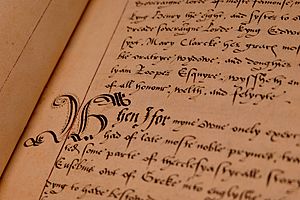Mary Basset facts for kids

Mary Basset (born around 1523 – died March 20, 1572) was an important translator. She was known for changing books from other languages into English. Mary Basset is famous because she was the only woman during the time of Queen Mary I to have her translated work printed and shared with others.
Contents
Early Life and Education
Mary Basset was born into a very well-known family. Her mother was Margaret Roper, and her father was William Roper. Her grandfather was the famous Sir Thomas More. Because of her family, Mary received an excellent education. She had many teachers, including a scholar named John Christopherson. This strong education helped her become a skilled translator.
Family Life and Marriages
Mary Basset married twice in her life. Her first husband was Stephen Clarke. They did not have any children together. After Stephen Clarke passed away, Mary married James Basset. This second marriage happened by June 1556.
Mary Basset's Important Translations
Mary Basset spent many years translating important books. Her most famous work was the first English translation of the book Ecclesiastical History by Eusebius. She worked on this translation between 1544 and 1553. Today, only one copy of her original handwritten translation still exists. It is kept in the British Library.
Understanding Ancient Texts
Mary's translation of Eusebius's Ecclesiastical History was based on a special edition printed in 1544. Her deep knowledge and understanding of the text were clear. She even added her own notes about any mistakes she found in the original book. This shows how smart and careful she was.
Other Known Works
In 1560, Mary also translated another important book. This was her grandfather Sir Thomas More's De tristitia Christi (The Sadness of Christ) into English. Some people, like Nicholas Harpsfield, wrote that Mary had translated other books too. These included the History of Socrates and works by other ancient writers like Theodoretus, Sozomenus, and Evagrius. However, copies of these other translations have not been found.
Mary's translations were not just about changing words. They also showed her interest in the important ideas and discussions of her time. This was similar to how her grandfather, Sir Thomas More, and her mother, Margaret Roper, approached their own writings.
Later Life and Legacy
Mary Basset passed away in London on March 20, 1572. She was not yet 50 years old. In her will, which she wrote in 1566, she mentioned several items that had belonged to her famous grandfather, Sir Thomas More. Her will also showed that she had strong religious beliefs. Mary Basset is remembered as a pioneering woman translator who helped bring important historical and religious texts to English readers.
 | Anna J. Cooper |
 | Mary McLeod Bethune |
 | Lillie Mae Bradford |

